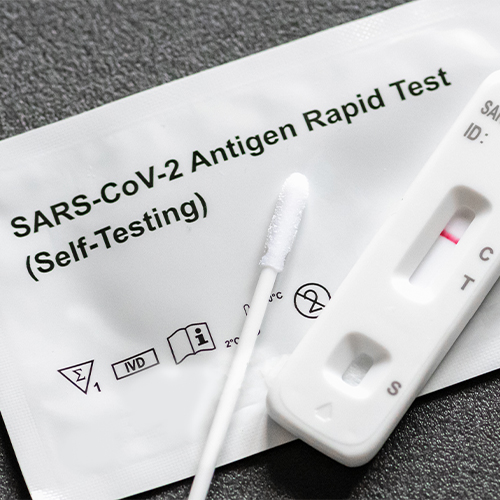In England, free testing, the legal requirement to isolate and various other measures will soon come to an end. We advise employers on how best to navigate the shift “from government restrictions to personal responsibility” in managing Covid-19.
On 21st February, the government unveiled its plan for “living with Covid-19”, announcing that all remaining legal measures in England would soon be lifted.
The end of isolation
On 24th February, the legal requirement to self-isolate following a positive test was removed, and contract tracing came to an end. Instead, people who test positive are now advised to stay at home and avoid contact with vulnerable people. After five days, they are advised to take a lateral flow test (LFT), followed by another the next day – if both are negative, they can safely return to their normal routine. The government has stated that this guidance will remain in place in England until April 2022, after which time new guidance will be issued.
On 1st April, free testing will end, and LFT orders have been restricted to once every three days until that date to prevent stockpiling. Free symptomatic testing will continue for social care workers and is also expected to continue for some at-risk groups, with more details on this still to be published.
“Markel advises that although the statutory requirement for employees to tell their employer if they have Covid-19, or its symptoms, has no longer applied since 24th February, employers can still require their staff to inform them under their own policies”, says Hannah Thomas, a solicitor and employment law specialist at Markel Law. “This will allow employers to assess the risk of transmission in the workplace and put in place any reasonable mitigation, such as instructing the infected employee to work from home if possible, or to stay away from their place of work until they can provide a negative LFT.”
“It would be reasonable for the employer to meet the cost of the LFT in that scenario, once free testing comes to an end”, says Hannah, but “paying for regular asymptomatic testing is unlikely to be feasible for many small businesses”. For employers with vulnerable service users or staff, however, more regular testing may make sense.
Sick pay
From 24th March, “day one sick pay” will end, and workers with Covid-19 will not begin receiving statutory sick pay (SSP) until their fourth day off work, in line with the SSP rules that were in place prior to the pandemic. People isolating will no longer be entitled to sick pay from this date unless they are unwell, but employers may still choose to offer sick pay in that scenario under their own sick pay policies, which would need to be updated accordingly.
“The main issue for employers is that if they instruct someone who has Covid-19 not to come into work – to try and reduce transmission to colleagues, in accordance with their own policies and risk assessment – but the employee is well enough to work and not self-certifying as incapacitated, time off would arguably have to be at full pay, at the employer’s cost,” says Hannah. However, she notes, reducing the risk of other employees falling ill and being absent will reduce overall disruption.
Duty of care
Despite the easing of restrictions, employers should remember that they still have a statutory duty of care towards their staff and others in the workplace under existing health and safety legislation, and “should take reasonable steps to reduce the risk of transmission of infectious disease in the workplace, as they would for other viruses which are hazardous to human health”, says Hannah.
Although employers will no longer be required to explicitly consider Covid-19 in their risk assessments from 1st April, they should still consider it “as part of their generic risk assessment of biological hazards in the workplace, under the terms of the Control of Substances Hazardous to Health Regulations 2002”.
In its ‘Living with Covid-19’ plan, the government sets out that “the majority of people previously considered clinically extremely vulnerable are now advised to follow the same general guidance as everyone else as a result of the protection they have received from vaccination.” However, some employees may still feel anxious about coming into contact with the virus in the workplace.
“If a worker believes that their employer has not taken reasonable steps to protect their safety, they could refuse to attend their workplace, which could ultimately lead to a tribunal claim”, says Hannah. However, she says, the tribunal would likely consider the reduced risk of the current variant in considering whether the employee’s actions were reasonable and would need to be convinced that the employee was in imminent danger in their workplace, as opposed to the wider world. “In terms of employee relations and being a responsible employer, I think discouraging employees from attending the workplace if they have Covid-19 is a reasonable position”, she says.
From 1st April, the government “will update guidance setting out the ongoing steps that people with Covid-19 should take to be careful and considerate of others”, with more details expected on targeted testing for vulnerable groups.
